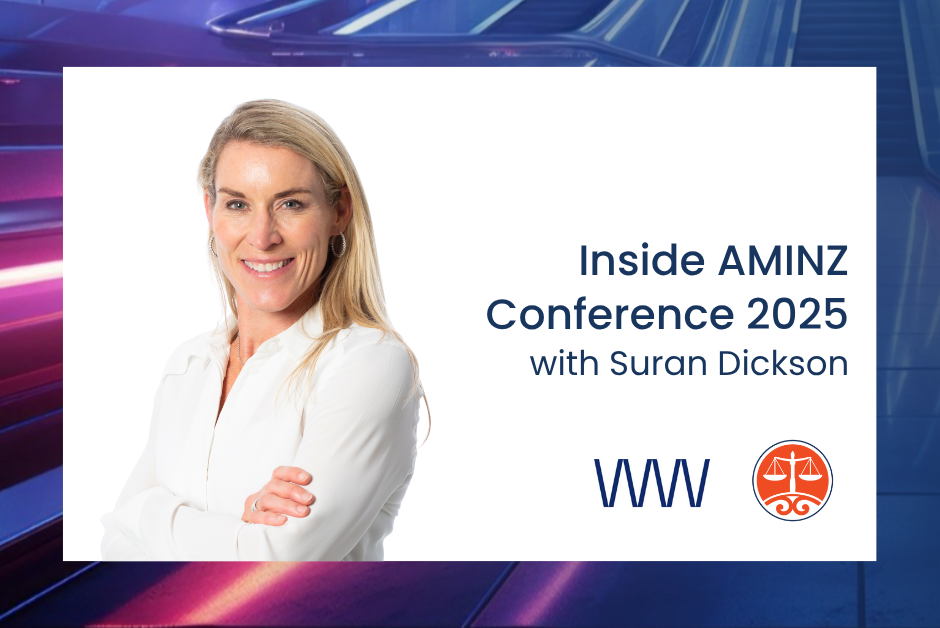Inside AMINZ Conference 2025: Fast Five with Suran Dickson
We are thrilled to announce Suran Dickson as one of our featured speakers at AMINZ Conference 2025. A trained mediator and internationally recognised expert in leadership and inclusion, Suran works with organisations and leaders to improve psychological safety, navigate conflict and create environments where people thrive. She’s delivered sessions for Google, Goldman Sachs, MI6 and government agencies across Aotearoa and the UK, and she brings a neuroscience-informed lens to her work in dispute resolution. She has received multiple awards and is ranked among the top ten most influential people in the UK's Pride list.
Kia ora Suran, we are very excited to have you speak at Conference! You've worked in high-trust and high-stakes environments both here and overseas – how have those experiences shaped your approach to conflict resolution?
I guess the more people you interact with in different environments, the greater understanding you have of humans – we have some similar traits/brain processes it helps to understand from a conflict perspective, but we also have many quirks of personality, childhood triggers, and communication differences that good leaders, mediators, parents, partners have a grasp of to drive better outcomes. Most people are attracted to safety and repelled by threat, and conflict environments create a sense of threat (for most); helping people sit through 'hard stuff' and understand each other's behaviour is at the crux of my work throughout my career.
How has your philosophy as a mediator evolved through your work in both the UK and New Zealand?
Having been a teacher, a CEO, a leadership coach and a parent (by far the hardest job!), I've informally studied human behaviour for many years now. Whilst we run a fairly set process as mediators, I believe that the better we understand the diversity of humans, the better we become at creating safe environments in which people feel heard and can listen to one another. I'm conscious of how societal power and the impact of discrimination impact people's willingness to speak up or trust the process, especially in conflict situations.
My philosophy has shifted from seeing mediation as a purely neutral facilitation, to understanding it as an active responsibility to create equity in the room - not by taking sides, but by recognising difference, naming power dynamics, and adapting how I work to ensure all voices are genuinely heard. Whether in the UK or Aotearoa, I’ve seen how essential it is to combine structure with empathy, and to be aware of cultural and neurodiverse communication styles, historical context, and lived experience. Mediation isn’t just about resolving a specific issue, it’s also about trying to maintain mana and dignity in the process.
Your Conference session will delve into the neuroscience behind conflict behaviours, and practical tools for more accessible and empathetic ADR. How did your interest in neuroscience begin?
I've always been fascinated by human behaviour trends so it's a natural curiosity to want to explore how our brains work – what is hard wired, what is plastic and how we overcome some of these natural, but unhelpful tendencies, to create a world in which people can thrive. My interest really deepened when I saw how often conflict is driven not just by logic or opposing views, but by threat perception – the way our nervous systems react under stress.
Understanding the difference between a regulated, collaborative brain and a reactive, defensive one has been helpful in how I approach mediation and coaching. Neuroscience offers practical insight into why people shut down, lash out, or avoid tough conversations, and more importantly, how we can help create the conditions for safety, curiosity, and connection in those moments.
What can our attendees expect from your session? And, in what ways will your session be relevant or useful to those working in dispute resolution?
Attendees can expect a thought-provoking session that blends neuroscience with real-world implications for how we show up in conflict resolution spaces. We’ll explore how the brain responds to threat and stress, and how those responses shape behaviour – both ours and others’. We’ll also look at how the world has changed from a diversity and inclusion perspective, and what that means for psychological safety and voice in mediation and ADR.
We’ll unpack the unconscious biases we all carry, and how these can unintentionally influence who we connect with, how we interpret behaviour, and who feels safe enough to speak up. I’ll also share some specific insights around supporting neurodiverse parties in mediation settings – ensuring we’re creating safe environments for all parties.
Thank you so much Suran. We look forward to hearing you speak at Conference next month!
Have you registered yet? AMINZ Conference 2025 kicks off on Wednesday 27 August with our AGM, with sessions running across Thursday 28 and Friday 29 August. Find out more and register.

